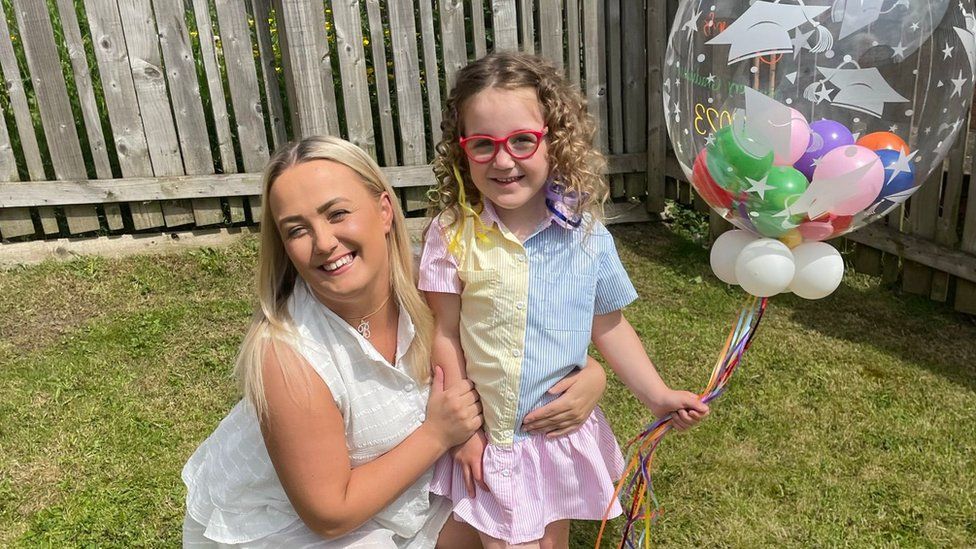
Olivia says bringing up four-year-old Brynn while on benefits was a challenge
By Emma Clifford Bell
BBC Scotland cost of living producer
Like all parents, 25-year-old Olivia wants to do the best she can for her daughter.
“You want them to be able to have everything and more,” she says.
Before her recent birthday, providing for her family was much more difficult because she received £75 a month less through her Universal Credit benefits payment.
For all claimants under 25 the standard rate is lower but campaigners say this hits young parents particularly hard.
Olivia, who lives in the east end of Glasgow, says it was a big shock when she first discovered she would get the lower payment.
“There’s this assumption that under 25s are staying with their parents when they’ve got a child, which is not true,” she says.
“It’s just bizarre that there’s this pay gap.”
Olivia says bringing up four-year-old Brynn while on benefits and working part-time was a challenge.
“I was struggling week-to-week to get what I needed for my daughter,” she says.
“I was going to food banks and my family nurse was helping me.”
Olivia is now paid £75 more in Universal Credit because she is 25
She thinks the higher rate she now gets will help.
“It’s definitely going to make a difference” she says.
“Before, it would be a struggle trying to make ends meet. It will help towards something that I couldn’t afford before.”
Olivia says she wants to see equal benefits for all ages.
“Milk costs the same, nappies cost the same, gas and electricity cost the same, so there shouldn’t be a discrimination against young parents to have less money,” she says.
According to Scottish government figures, 55% of children with mothers under the age of 25 in Scotland are living in poverty – more than double the overall rate.
Charity One Parent Families Scotland (OPFS) is leading a growing campaign to top up Universal Credit payments for young parents.
Seventy other organisations across Scotland have joined forces to call for the change, including the Poverty Alliance, Barnardo’s Scotland and Save the Children.
Satwat Rehman, the chief executive of OPFS, says she is calling for action at Scottish government level as well as at Westminster level.
Olivia thinks the extra benefits will make a difference
The charity says the UK government should reverse the current policy and pay under-25s the same rate of benefits as over-25s.
The group also wants the Scottish government to top up the Scottish Child Payment to balance benefits for all.
“All the things that we hear people are suffering from in the cost of living crisis is exacerbated for young parents because they’re given less to begin with,” says Satwat.
“Everything costs the same. Things aren’t cheaper simply because you’re under 25, and what you need for your child doesn’t change depending on your age as a parent.”
Through OPFS group sessions, parents also often talk about the levels of stigma and judgement they face.
“Assumptions are made if you’re a young parent,” says Satwat.
“People think you’ve done this in order to be able to get benefits. What they don’t understand, is actually it’s below the levels anybody else would get.
“This is not about anything other than the essentials, it’s the basics of living that young parents are having to go into debt for.”
Call for more powers
A spokesperson for the UK government’s Department of Work and Pensions (DWP) said: “Universal Credit entitlement depends on the individual circumstances of the claimant.
“Parents regardless of their age receive an additional payment for children. Some young parents who are in work will have higher entitlements than on legacy benefits.”
Scotland’s Social Justice Secretary Shirley-Anne Somerville said: “Universal Credit is reserved to the UK government, which has deliberately introduced age discrimination within it and we agree that it should be paid at the same amount, as the costs for housing, energy, and bills are the same no matter the age of the person.
“A report published yesterday estimates 90,000 fewer children will be in relative and absolute poverty in 2023-24 as a result of Scottish government policies. This includes lifting an estimated 50,000 children out of poverty through investment in the Scottish Child Payment.
“We are doing all we can to tackle poverty and protect people from UK government policies but we do so within a fixed budget and limited powers. That is why we will continue to call for more powers so we can fully support people.”








